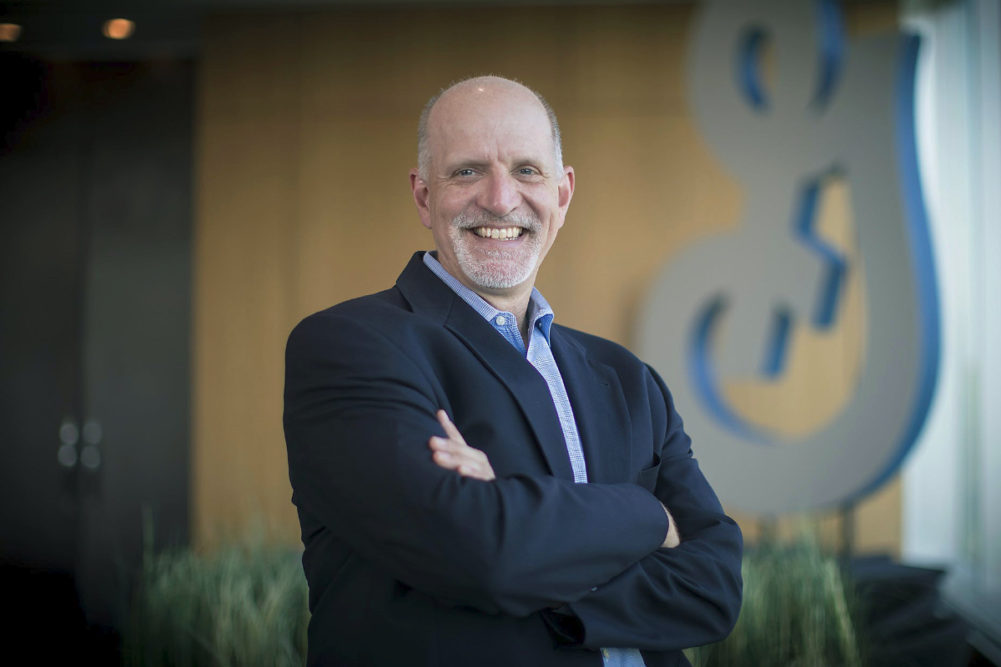MINNEAPOLIS — Between a global pandemic and nationwide protests against police brutality, 2020 will go down as a year of lessons for General Mills, Inc., said Jeffrey L. Harmening, chairman and chief executive officer, during a virtual conversation with the Consumer Brands Association (CBA).
One of the biggest lessons came from the shift to working from home at the beginning of the coronavirus (COVID-19) outbreak.
“We spent less time talking to ourselves and more time focusing on the problems of the day,” Mr. Harmening said in the discussion, the first in a series of leadership and education sessions hosted by the CBA as part of its CPG Speaks program.
Fewer internal meetings meant the company spent more time figuring out how to meet consumer needs and working with suppliers and retailers.
“The game is played on the outside, not the inside,” Mr. Harmening said. “That's one of the things that we learned.”
Lessons from the initial COVID-19 outbreak in China also helped shaped the company’s response to the spread of the virus in the United States.
“The first lesson we learned is that we actually could do business during a pandemic,” he said. “We just had to do things a little differently.”
That meant implementing temperature checks, face masks, social distancing and other measures required to run a successful manufacturing operation during a health crisis, which General Mills did in China without a single case of COVID-19. This early success instilled a sense of confidence among line workers in the United States, where 98% of manufacturing and logistics employees showed up for work everyday during the pandemic, Mr. Harmening said.
“That's higher than the number of people who show up when we don't have a pandemic,” he said.
Keeping production lines running and product moving was critical to meeting a surge in demand during the peak pantry stocking period in March and April.
“I can't say for sure how much of the demand is going to stick,” Mr. Harmening said. “Some of it will, because consumers have found something that in some cases wasn't there before.”
He cited growing interest in baking as an example. General Mills’ baking segment generated 68% retail sales growth in the fourth quarter. The company is seeking to maintain growth by engaging with consumers through brand websites, which offer recipes and step-by-step instructions for home bakers.
“This pandemic showed that we need to be in the business of solving real consumer problems, not ones that are made up in our own minds,” Mr. Harmening said. “We changed our approach of having really intricate, fancy things that people can do with their baking items. Helping solve some of the basic needs they have in their pantry is becoming increasingly important.”
While brand websites offer one way to engage with consumers, more than 80% of the company’s e-commerce business comes through grocery stores.
“That will have an implication because when you think about that environment, there will probably be fewer SKUs on the shelf and more SKUs that are fast turning,” he said.
Addressing racial equality
The racial unrest that broke out in May following the death of George Floyd prompted Mr. Harmening to think more critically about General Mills’ supplier base.
“There's a role for what goes into the brand,” he said. “Whether those are suppliers that supply ingredients, or whether those are suppliers for communication, it’s about making sure that we have as diverse a population of suppliers as possible, because nothing gets people out of a current system like economic justice.”
The company recently announced several initiatives aimed at addressing systemic racism, including offering immediate relief to food pantries throughout the twin cities and contributing to the physical recovery of buildings damaged during protests.
“If you're dealing with something as complex as systematic racism … you need to have some immediate progress while playing the long game,” Mr. Harmening said. “
Longer-term efforts include engaging with other businesses about ways to promote justice and diversity. The company already has convened more than 100 businesses in the twin cities to address issues surrounding race in the workplace. It also is partnering with local leaders and politicians to support changes in policing, health care and education.
“General Mills is not going to recreate a police policy, but we can lend our voice along with others,” Mr. Harmening said.





